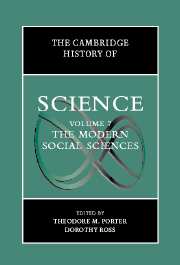Book contents
- Frontmatter
- 1 Introduction: Writing the History of Social Science
- PART I SCIENCES OF THE SOCIAL TO THE LATE NINETEENTH CENTURY
- PART II THE DISCIPLINES IN WESTERN EUROPE AND NORTH AMERICA SINCE ABOUT 1880
- 13 Changing Contours of The Social Science Disciplines
- 14 Statistics and Statistical Methods
- 15 Psychology
- 16 Economics
- 17 Political Science
- 18 Sociology
- 19 Anthropology
- 20 Geography
- 21 History and the Social Sciences
- PART III THE INTERNATIONALIZATION OF THE SOCIAL SCIENCES
- PART IV SOCIAL SCIENCE AS DISCOURSE AND PRACTICE IN PUBLIC AND PRIVATE LIFE
- Index
- References
15 - Psychology
from PART II - THE DISCIPLINES IN WESTERN EUROPE AND NORTH AMERICA SINCE ABOUT 1880
Published online by Cambridge University Press: 28 March 2008
- Frontmatter
- 1 Introduction: Writing the History of Social Science
- PART I SCIENCES OF THE SOCIAL TO THE LATE NINETEENTH CENTURY
- PART II THE DISCIPLINES IN WESTERN EUROPE AND NORTH AMERICA SINCE ABOUT 1880
- 13 Changing Contours of The Social Science Disciplines
- 14 Statistics and Statistical Methods
- 15 Psychology
- 16 Economics
- 17 Political Science
- 18 Sociology
- 19 Anthropology
- 20 Geography
- 21 History and the Social Sciences
- PART III THE INTERNATIONALIZATION OF THE SOCIAL SCIENCES
- PART IV SOCIAL SCIENCE AS DISCOURSE AND PRACTICE IN PUBLIC AND PRIVATE LIFE
- Index
- References
Summary
Psychology occupies a peculiar place among the sciences, suspended between methodological orientations derived from the physical and biological sciences and a subject matter that extends into the social and human sciences. The struggle to create a science of both subjectivity and behavior, and the related effort to develop professional practices utilizing that science’s results, provide interesting examples of both the reach and the limits of such scientific ideals as objectivity, measurability, repeatability, and cumulative knowledge acquisition. In addition, psychologists’ struggles to live by such ideals while competing with others to fulfill multiple public demands for their services illuminate both the formative impact of science on modern life, and the effects of technocratic hopes on science.
The aim of this chapter is to sketch the results of a broad shift in the historiography of psychology over the past twenty years, from the achievements of important figures and the history of psychological systems and theories to the social and cultural relations of psychological thought and practice. In the process, I hope to bring out the interrelationships of psychological research and societal practices both with one another and with prevailing cultural values and institutions in different times and places, while at the same time attempting to bring out certain common threads in this varied narrative.
One of those common threads is that the history of psychology has been a continuous struggle by multiple participants to occupy and define a sharply contested, but never clearly bounded, discursive and practical field. The emergence and institutionalization of both the discipline and the profession called “psychology” are often portrayed as acts of liberation from philosophy or medicine, but these efforts to establish scientific and professional autonomy have never completely succeeded.
- Type
- Chapter
- Information
- The Cambridge History of Science , pp. 251 - 274Publisher: Cambridge University PressPrint publication year: 2003
References
- 12
- Cited by

